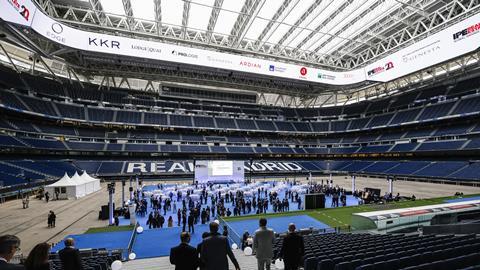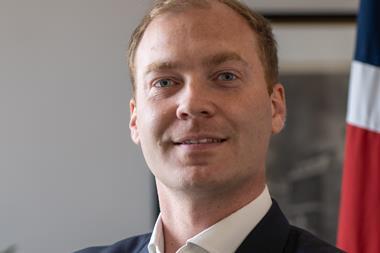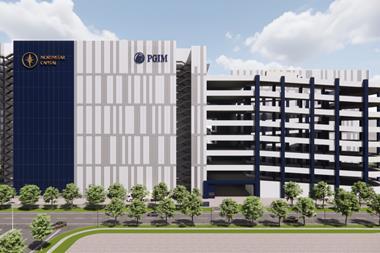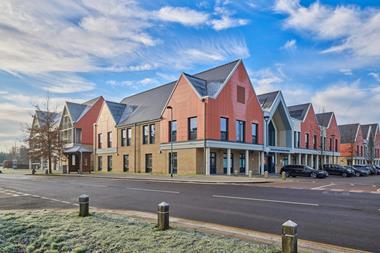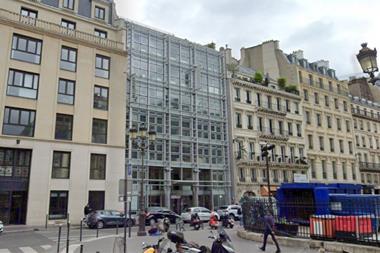It is rare that IPE Real Assets turns to football analogies (or soccer, depending on where you are reading this), but as the 20th IPE Real Estate Global Conference & Awards concluded at the brand new Bernabéu stadium in Madrid it was unavoidable. It felt very much like ‘a game of two halves’.

As the winner of the last award was revealed, compere for the evening Nils Kok, professor of real estate finance at Maastricht University, congratulated the winner – Ivanhoé Cambridge, the real estate arm of Canada’s CDPQ, which took home the gong for global real estate investor of the year.
Bucking the stereotypical image of a professor, Kok was dressed in a full Real Madrid kit. Two hours earlier he had made his entrance onto the stage by running down the steps of the Bernabéu, blowing a referees’ whistle, before executing several footballing tricks and proceeding to boot the ball into the crowd.
It was quite a way to kickstart the 20th IPE Real Estate Awards and the first corporate event to be held on Real Madrid’s fully retractable pitch (the grass is transported underground in several sections) since recently being redeveloped. Next week, the stadium will host its first ever major, full-stadium (non-footballing) event when Taylor Swift will take to the stage. For the meantime, the star of the show was the institutional real estate industry.
Earlier in the day, during the ‘first half’, and dressed in more traditional conference attire, Kok chaired the IPE Real Estate Global Conference, addressing some of the more sobering issues facing the institutional real estate industry, from macroeconomics and interest rates to climate change. Geopolitics expert Dr Sajjan Gohel provided a particularly anxiety-inducing summary of the dangers facing the world.
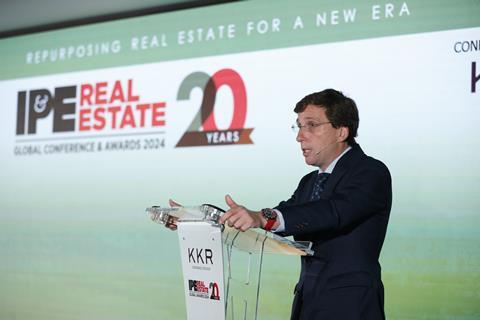
The conference was welcomed by José Luis Martinez-Almeida, the mayor of Madrid (who incidentally is an Atletico Madrid fan). He clearly recognised the opportunity of having close to 400 real estate investors, investment managers and advisers in his city, announcing his commitment to delivering new homes through public-private partnerships and acknowledged the need to address planning restrictions and to create a more attractive regulatory environment for investors.
The importance of regulatory stability has been one of the key issues for institutional real estate investors in recent months. It comes at a time when investors are looking to make housing and the evolving ‘living sector’ a bigger proportion of portfolios – as they move away from their historical bias to office and retail.
The topic came up during the Investor Forum roundtable the day before, when a smaller gathering of investors were asked what ‘kept them awake at night’. On the main day of the conference, Laurent Ternisien, deputy CEO of BNP Paribas Real Estate Investment Management, explained how sudden changes in regulation were the problem – not regulations per se. In fact, while less onerous regulations can allow for greater flexibility, more stringent regulatory regimes can lead to lower levels of reputational risk.
The Netherlands is a case in point – a court recently ruled certain rental increases in the past unlawful, potentially affecting large institutionally-owned portfolios. And the UK could be next – on the same day of the conference, the UK government announced a general election in July, paving the way for a potential formation of a Labour government in the summer.
Gijs Plantinga, director of business development at Bouwinvest, and Rafael Torres Villalba, senior portfolio manager at APG, both talked about how the two Dutch investors are seeking to invest in affordable housing in their domestic market.
Robert-Jan Foortse, head of European real estate at APG, recently told IPE Real Assets how it has been tasked with investing €5bn in additional affordable housing in the Netherlands by its largest pension fund client ABP. He also expected APG and real estate investors to become more active in the second half of the year.
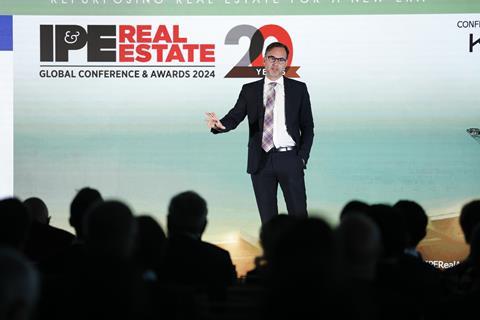
This sentiment could be heard in conversations at the conference in Madrid – that the second half of the year could put in a better performance. But much of that conviction is predicated on the assumption that interest rates will begin to decline in the coming months.
When pressed for a prediction, opening keynote speaker Guillermo Tolosa, special assistant director at the International Monetary Fund, suggested a series of quarterly 25bps cuts starting in June.
Tolosa offered another reason to be cheerful: despite the seismic shock of rapidly rising interest rates, the European economy showed surprising resilience. Nothing systematic or substantial – aside from Credit Suisse, perhaps – “broke” in the face of such aggressive monetary policy.
But policymakers face treading a “narrow path” between “killing an incipient recovery” and “inflaming” inflation. Another note of caution: interest rates are likely to fall, but they could also plateau in mid-2025 at a new neutral rate of 2.5%, which is higher than it was in the more recent past. And so investors might see lower rates in the near term, but the asset class might have to get used to rates that are higher over the longer term than they have been used to.
But in an onstage interview, Julie Donegan, the director of real estate at the California State Teachers’ Retirement System (CalSTRS), emphasised that – much like residential regulations – it was the volatility of interest rates that really posed a challenge to real estate investors.
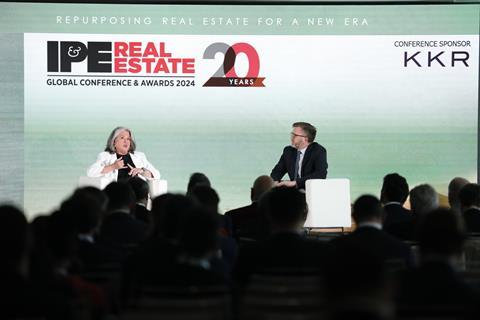
“I think the real challenge is underwriting a stable interest rate,” she said. “It’s the volatility that tends to kill deals, because you’ll start underwriting a transaction and then, before you’re even through committee, if there’s a change [it] may wipe out that deal. [Even] if it’s five, six or 7% – as long as we think it’s going to be there for a while you can find a way to do the underwriting.”
Donegan added: “I’m sure there’s many in the room that remember when it was much higher,” she said. “This was an abnormal period where we had such low interest rates.”
Next year’s conference will be held in Copenhagen and by then investors could well have returned to the market in earnest, encouraged by interest-rate cuts and greater stability. But only time will tell.






